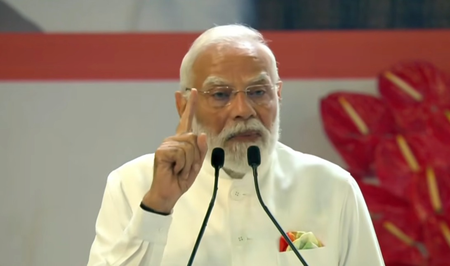

New Delhi, Nov 7 (IANS) Prime Minister Narendra Modi on Friday inaugurated the year-long commemoration of 150 years of India’s National Song, ‘Vande Mataram’, at the Indira Gandhi Indoor Stadium. Speaking at the event, he said that Vande Mataram boosts the nation’s self-confidence and continues to inspire generations.
On the occasion, the Prime Minister released a commemorative stamp and coin dedicated to Vande Mataram. He also visited an exhibition organised around the theme of the national song.
PM Modi was accompanied by Delhi Chief Minister Rekha Gupta, Union Minister for Culture and Tourism Gajendra Singh Shekhawat, and Lieutenant Governor V.K. Saxena.
The programme marked the formal launch of a year-long nationwide celebration that will continue until November 7, 2026, commemorating 150 years of this timeless composition by Bankim Chandra Chatterjee. The song, which inspired India’s freedom movement, continues to evoke national pride and unity even today.
Addressing the gathering, Prime Minister Modi said, “Today, millions of people from across the country are connected with us. I extend my greetings to all of them with ‘Vande Mataram’. November 7 is a historic day; we are celebrating the 150th anniversary of Vande Mataram. This auspicious occasion will inspire us anew and fill millions of Indians with fresh energy. To mark this moment in history, a special coin and postal stamp on Vande Mataram have been released today. Vande Mataram — this word is a mantra, an energy, a dream, and a resolution. Vande Mataram connects us to our history. It boosts our self-confidence and reminds us that there is no dream we cannot fulfil.”
He added, “The experience of mass singing of Vande Mataram is beyond words. Today, November 7, is a historic day as we celebrate the 150-year Maha Utsav. This celebration will bring new inspiration and energy. To make this day memorable, a special coin and stamp have been issued.”
The Prime Minister also paid tribute to those who sacrificed their lives for the nation. “I bow to all who laid down their lives for our motherland. I also congratulate all my fellow citizens. Every patriotic song carries its own emotion and message, but the central expression of Vande Mataram is ‘Bharat’ and ‘Maa Bharati’,” he said.
Union Culture and Tourism Minister Gajendra Singh Shekhawat, in his address, said, “Today, the entire country is witnessing a mass singing of Vande Mataram. We are here to remember the song that contributed to the beginning of our independence struggle. Thousands who sacrificed their lives might have uttered their last words — Vande Mataram. As we mark 150 years of this iconic song, we must remember that if there is one spirit that can unite all Indians in achieving the dream of a Viksit Bharat (Developed India), it is Vande Mataram. Today, we are also launching a digital portal through which citizens can send their own renditions of Vande Mataram in their voices.”
The celebrations witnessed the mass singing of the full version of Vande Mataram at around 9.50 a.m. across public spaces nationwide, with enthusiastic participation from citizens, synchronised with the main programme in Delhi.
The year 2025 marks the 150th anniversary of Vande Mataram. The national song was composed during the auspicious occasion of Akshaya Navami on November 7, 1875. It first appeared in the literary journal Bangadarshan as part of Bankim Chandra Chatterjee’s celebrated novel Anandamath.
The song, invoking the Motherland as the embodiment of strength, prosperity, and divinity, gave poetic expression to India’s awakening spirit of unity and self-respect. It soon became an enduring symbol of devotion to the nation.
Historical records affirm that Vande Mataram was composed in 1875. Sri Aurobindo, writing in the English daily Bande Mataram on April 16, 1907, noted that Bankim had written his renowned song 32 years earlier. He observed that few paid attention at the time, but when Bengal awoke from its long delusion, the people sought truth — and in that moment of awakening, someone sang “Bande Mataram”.
Bankim Chandra Chatterjee (1838-1894), the author of Vande Mataram, was one of the most prominent figures of 19th-century Bengal. A novelist, poet, and essayist, he played a pivotal role in shaping modern Bengali prose and articulating the emerging spirit of Indian nationalism. His works reflect a deep intellectual and cultural engagement with the idea of India as a unified, spiritually vibrant nation.
Vande Mataram became the emblem of India’s struggle for independence, encapsulating the collective aspiration for self-governance and the emotional connection between the people and their homeland. Initially popularised during the Swadeshi and anti-partition movements, it soon transcended regional and linguistic boundaries to serve as an anthem of national awakening.
–IANS
jk/dpb
